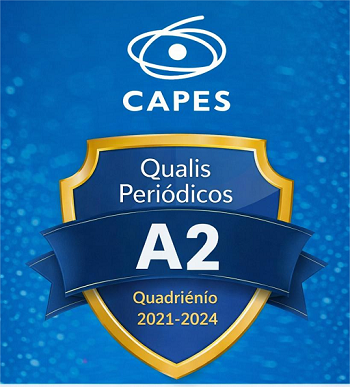O impacto da Inteligência Artificial na personalização do ensino
Palavras-chave:
Inteligência Artificial, Personalização do Ensino, Tecnologia Educacional, Análise de Dados na Educação, Sistemas de Tutoria InteligentesResumo
Tendo em vista a crescente integração da tecnologia na educação e a necessidade de métodos de ensino mais adaptativos, o presente estudo trata sobre o impacto da inteligência artificial (IA) na personalização do ensino, a fim de explorar como essa tecnologia pode transformar a experiência educacional. Para tanto, foi necessário analisar a eficácia dos sistemas de tutoria inteligentes, investigar a importância da análise de dados educacionais e avaliar a capacidade da IA de fornecer feedback personalizado e adaptativo. Realizou-se, então, uma revisão da literatura, abrangendo estudos de caso e pesquisas acadêmicas recentes. Diante disso, verificou-se que a IA tem potencial para melhorar significativamente o engajamento e o desempenho dos alunos, facilitar uma aprendizagem mais adaptada às necessidades individuais e oferecer insights valiosos para os educadores, onde foi possível concluir que, apesar dos desafios relacionados à ética e privacidade de dados, a IA representa uma ferramenta promissora para enriquecer a educação, exigindo uma abordagem equilibrada e ética em sua implementação.
Palavras-chave: ; ; ; ; .
Referências
Baker, R. S. (2016). Stupid tutoring systems, intelligent humans. International Journal of Artifi-cial Intelligence in Education, 26(2), 600-614.
Baker, R., & Smith, L. (2019). Educational data mining and learning analytics. Cambridge Handbook of the Learning Sciences.
Blikstein, P., & Worsley, M. (2016). Children are not hackers: Building a culture of powerful ideas, deep learning, and equity in the maker movement. Makeology: Makerspaces as Learning Environments (Volume 1), 64-79.
Chen, G. D., Chang, C. K., & Wang, C. Y. (2012). Ubiquitous learning website: Scaffold learn-ers by mobile devices with information-aware techniques. Computers & Education, 58(1), 77-90.
Drigas, A. S., & Ioannidou, R. E. (2013). Artificial intelligence and personalized education. International Journal of Emerging Technologies in Learning, 8(2), 26-33.
Duan, Y., Edwards, J. S., & Dwivedi, Y. K. (2019). Artificial intelligence for decision making in the era of Big Data – evolution, challenges and research agenda. International Journal of In-formation Management, 48, 63-71.
Ferguson, R., & Clow, D. (2017). Where is the evidence? A call to action for learning analytics. Learning: Research and Practice, 3(2), 113-126.
He, W., Xu, G., & Kruck, S. E. (2014). Online IS education for the 21st century. Journal of Information Systems Education, 25(2), 101-105.
Holmes, W., Bialik, M., & Fadel, C. (2019). Artificial intelligence in education: Promises and implications for teaching and learning. Center for Curriculum Redesign.
Kumar, A. N. (2016). Personalized adaptive learning: An emerging pedagogical approach ena-bled by a smart learning environment. Smart Learning Environments, 3(1), 1-16.
Li, Y., Wang, Q., & Miao, Y. (2020). Using artificial intelligence to support education for sus-tainable development: A case study of an intelligent tutoring system. Sustainability, 12(8), 3273.
Luckin, R. (2017). Towards artificial intelligence-based assessment systems. Nature Human Behaviour, 1(1), 0028.
Porayska-Pomsta, K., Mavrikis, M., & Pain, H. (2018). Artificial intelligence in education: De-mystifying the reality and capitalizing on its promise. Policy Brief, UCL Knowledge Lab.
Roll, I., & Wylie, R. (2016). Evolution and revolution in artificial intelligence in education. International Journal of Artificial Intelligence in Education, 26(2), 582-599.
Selwyn, N. (2019). Should robots replace teachers? AI and the future of education. Polity.
Siemens, G., & Long, P. (2011). Penetrating the fog: Analytics in learning and education. ED-UCAUSE Review, 46(5), 30-40.
Sottilare, R. A., Graesser, A. C., Hu, X., & Holden, H. K. (Eds.). (2018). Design recommenda-tions for intelligent tutoring systems: Volume 6 - Personalization. U.S. Army Research Labora-tory.
Timms, M. J. (2016). Letting artificial intelligence in education out of the box: Educational cobots and smart classrooms. International Journal of Artificial Intelligence in Education, 26(2), 701-712.
Watters, A. (2015). The monsters of education technology. CreateSpace Independent Publish-ing Platform.
Woolf, B. P. (2010). Building intelligent interactive tutors: Student-centered strategies for revo-lutionizing e-learning. Morgan Kaufmann.
Xie, H., Chu, H. C., Hwang, G. J., & Wang, C. C. (2019). Trends and development of learning analytics and artificial intelligence in education: A systematic review. Interactive Learning En-vironments.
Zhou, M., & Brown, D. (2020). Educational learning theories: 2nd edition. Milkshake Media.
Zawacki-Richter, O., Marín, V. I., Bond, M., & Gouverneur, F. (2019). Systematic review of research on artificial intelligence applications in higher education – where are the educators? International Journal of Educational Technology in Higher Education, 16(1), 1-27.


